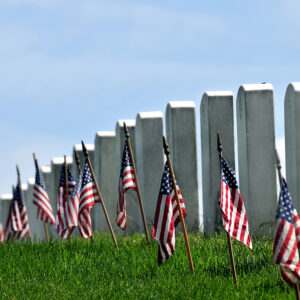I’ve written so many Memorial Day remembrances over the years that one might ask: What is there left to say? Plenty.
Yes, this is the day to honor those who paid the ultimate sacrifice in defense of their country. It’s also the time to bring close to our hearts the family and friends of the fallen — those who bear the burden of loss not just on this day but every day.
On average, when a service member dies, that death is felt by 10 others. Over time that is a long legacy of loss. On Memorial Day, many will decorate grave-markers with wreaths. They’ll walk the rows of crosses and Stars of David in the cemetery above Omaha Beach at Normandy to find the white stone marking their forefathers in the “greatest generation.”
This Memorial Day happens in time of war, as another nation battles for its freedom thousands of miles away, fighting back against naked aggression. Ukrainians mark May 8 as the day of Remembrance and Reconciliation. They also commemorate Holodomor Memorial Day each year on the fourth Friday of November to recall the mass starvation imposed on Ukraine by Stalin in 1932 — an atrocity that killed millions of people.
Still, what occupies every waking moment of Ukrainians today is not the tragedies and losses of yesterday, but the threat they, their families, communities and nation are fighting like hell today in order to even have a tomorrow.
Their struggle reminds us not just of whom we have lost, but why we fight. To many of us, “freedom isn’t free” is just a slogan, but to the Ukrainians it’s a reality they’re living (and dying) every day.
The brutal truth of human imperfection, as the war against Ukraine so cruelly reminds us, is that there will always be more to remember on Memorial Days in parts of the real world. There will always be evil people bringing war to good people, and good people will have to fight and die to stop them.
Another constant is that stopping wars before they start no less demands service and sacrifice. Still, in the end that determination and vigilance is a better price to pay than the wages of blood paid by those who die in battle — and the innocents who, sadly, get in the way.
We would live in a better world if all countries truly respected settling their differences without the force of arms. That’s not the world we have, unfortunately. We live in a world where dangerous nations refuse to honor that norm.
Vladimir Putin’s Russia has not just attacked Ukraine. In recent times, it has forcibly seized parts of Moldova and Georgia. And it has fueled internecine violence in places like Syria, Libya and Azerbaijan.
China took Tibet by force, attacked the border of its neighbor in India, and routinely threatens the invasion of Taiwan.
Iran uses terrorism, insurgencies, proxy wars and armed aggression as instruments of foreign policy.
These three nations are worth highlighting because they share a dream of a world without America and a determination to achieve that end. Together their economies, military capabilities, nuclear threats and capacity to endanger U.S. interests are arguably on scale greater than that posed by the Soviet Union during the Cold War.
The shape of America’s future Memorial Days, whether they are remembrances of wars pasts or new conflicts sparked by the instigation and aggression of these hostile and malicious powers, will be determined by our resolve, capacity and intelligence in countering them and stopping the next wars before they start.
Every instrument from diplomacy on down ought to be used, but stopping them starts with taking seriously what they take seriously. They don’t care what we “say.” They care what we “do.” If we don’t demonstrate the capacity and willingness to practice peace through strength — not just with a strong military, but with a strong economy and a strong people, and use our strength with wisdom, integrity and prudence, they will see that as an invitation for violence and aggression.
Remember this Memorial Day. Remember as well our responsibilities every day. We honor our dead best when we honor what they fought for by embracing the obligations to be the strong America that Americans need.

